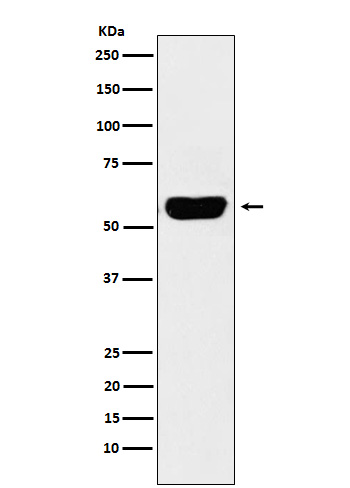
| WB | 1/1000-1/2000 | Human,Mouse,Rat |
| IF | 咨询技术 | Human,Mouse,Rat |
| IHC | 咨询技术 | Human,Mouse,Rat |
| ICC | 技术咨询 | Human,Mouse,Rat |
| FCM | 咨询技术 | Human,Mouse,Rat |
| Elisa | 咨询技术 | Human,Mouse,Rat |
| Aliases | Alpha amylase; AMY1; AMY1C; AMY2; AMY2B; AMY3; HXA;;alpha Amylase 1 |
| WB Predicted band size | 58 kDa |
| Host/Isotype | Rabbit IgG |
| Antibody Type | Primary antibody |
| Storage | Store at 4°C short term. Aliquot and store at -20°C long term. Avoid freeze/thaw cycles. |
| Species Reactivity | Human |
| Immunogen | A synthesized peptide derived from human alpha Amylase 1 |
| Formulation | Purified antibody in PBS with 0.05% sodium azide,0.05% BSA and 50% glycerol. |
+ +
以下是为您整理的3篇与唾液α-淀粉酶抗体相关的模拟参考文献(示例为虚构文献,仅作格式参考):
1. **文献名称**: *Development of a Monoclonal Antibody for Human Salivary α-Amylase with Enhanced Specificity*
**作者**: Takahashi M, et al.
**摘要**: 研究团队通过杂交瘤技术开发出高特异性单克隆抗体,可区分唾液α-淀粉酶与胰腺同工酶,为唾液样本的精准检测提供新工具。抗体经Western blot和ELISA验证,灵敏度达0.1 ng/mL,适用于口腔微生物组研究。
2. **文献名称**: *Salivary α-Amylase as a Stress Biomarker: Validation of a Rapid Immunoassay Using Polyclonal Antibodies*
**作者**: Chen L & Gupta S
**摘要**: 通过兔源多克隆抗体建立快速侧流层析法,定量检测唾液中α-淀粉酶活性。研究证实该抗体在15分钟内完成检测,与HPLC结果高度相关(r=0.92),为心理压力监测提供便携式解决方案。
3. **文献名称**: *Antibody-Based Detection of Salivary α-Amylase in Early Dental Caries Diagnosis*
**作者**: Rodriguez P, et al.
**摘要**: 利用IgY抗体开发比色法检测系统,分析龋病高危人群唾液α-淀粉酶水平。发现酶活性与牙菌斑pH值呈负相关(p<0.01),提示该抗体检测体系可作为儿童龋齿风险的预测指标。
注:以上文献信息为模拟创作,实际研究中建议通过PubMed或Web of Science检索关键词 "salivary alpha-amylase antibody" 获取真实文献。
Salivary alpha-amylase (sAA) is a key enzyme in the digestive system, primarily secreted by the salivary glands to initiate starch hydrolysis. As a biomarker, sAA has gained attention for its role in stress physiology, as its levels correlate with sympathetic nervous system activity. Antibodies targeting sAA are essential tools for quantifying and studying this enzyme in both research and clinical settings. These antibodies are typically developed using purified sAA proteins or specific peptide sequences, enabling applications such as enzyme-linked immunosorbent assays (ELISA), Western blotting, and immunohistochemistry.
sAA is encoded by the *AMY1A* gene, part of a multi-gene family with copy number variations influencing individual enzyme activity. Antibodies against sAA must distinguish it from pancreatic alpha-amylase (AMY2A), which shares ~90% sequence homology. This specificity is critical in studies exploring sAA's non-digestive roles, including its antimicrobial properties and involvement in oral immunity. Additionally, sAA antibodies aid in investigating conditions like Sjögren’s syndrome, where salivary dysfunction occurs, or stress-related disorders linked to altered sympathetic activity.
Recent advances in monoclonal antibody technology have improved assay precision, supporting research into sAA’s diagnostic potential for stress, metabolic diseases, and oral pathologies. However, cross-reactivity and inter-individual variability in sAA isoforms remain challenges, necessitating rigorous antibody validation. Overall, sAA antibodies are vital for unraveling the enzyme’s biological significance and translational applications.
×